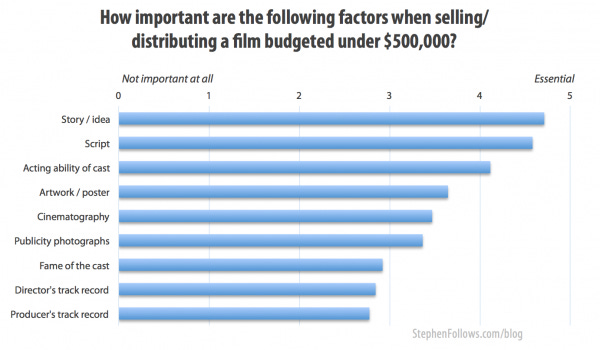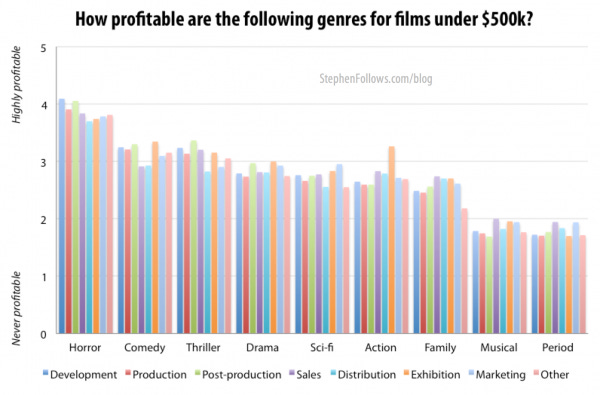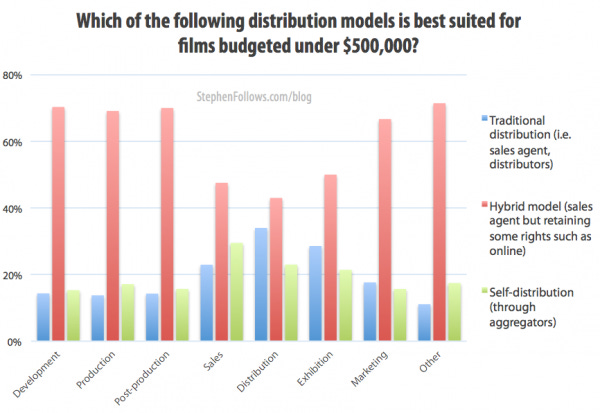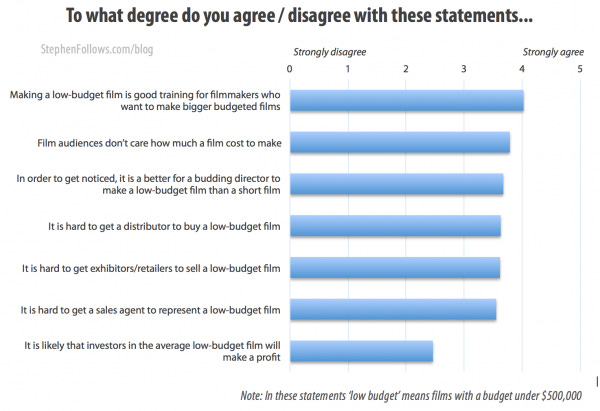Last week I shared some results from a survey I conducted of 542 film industry business professionals who have attended Cannes, AFM or Berlin in the past five years. I looked at their perceptions of how much "micro" and "low" budget films cost, and the amount needed to make a 'commercially viable' film. Today I am sharing more results, focusing on elements which filmmakers can influence in order to improve the chances of success with their low budget film - i.e. the film's elements, genre and distribution route. I also canvassed opinions on statements on a variety of topics relevant to low budget feature filmmakers. In summary...
The single most important factor in the success of a low budget film is the script
The track record of the director and producer don't seem to matter much
Everyone thinks that horror is the most profitable genre for low budget films
Only 17% of industry professionals think that the traditional distribution model is most appropriate for low budget films
Low budget films are great for training and showcasing talent...
... but not so great for investors seeking a profit
Which elements make a low budget films sell?
The script is everything. Interestingly, the track record of the director and producer is of little interest, suggesting that low budget films are judged mostly on the merit of the finished film, rather than "who you know".
These results are consistent throughout the industry, however those in Sales and Distribution rate the artwork/poster above the abilities of the cast.
Which genres are best suited to low budgets?
This question provides proof of the industry-wide belief that horror rules on low budget.
It does not, however, reveal that horror actually provides the best profit margin, only that everyone thinks it does. Interestingly, those in Exhibition are more supportive of Action films than everyone else.
Which distribution model is best for low budget films?
The "traditional" distribution model (i.e a film's rights being sold via a single sales agent at a film market to distributors purchasing 'all media' in their territory) has been under threat in recent years. Digital cinema distribution, audience power, piracy, the globalised world, new distribution platforms and a massive increase in the numbers of films being made have all played a part in the unraveling of this model. Because of these changes, I was keen to canvass opinions on how low budget filmmakers should approach distribution in 2014. The overall feeling was that the "traditional" model is not really appropriate for low budget films.
When we split by sector we can see a divide between two broad camps. Those working in Sales, Distribution and Exhibition are considerably less keen on hybrid distribution models that the rest of the industry. These numbers don't reveal why this is, although two reasons which spring to mind are that either...
Those closest to the distribution chain see the process as more straightforward ('the curse of knowledge'), or...
They are unwilling to create new hybrid models, wanting filmmakers to comply within the existing system or to do it all themselves.
What is a low budget film good for?
I asked my audience to rate (out of 5) how much they agreed with a variety of statements. In the questions I defined a "low budget film" as a feature film budgeted at under US $500,000. The overall feeling was that low budget films are very useful to filmmakers (as training and showreels) but not really to investors seeking a profit.
And those same results split by sector show a rough consensus, save for the fact that those in Exhibition seem less keen on directors making features as showreel pieces.
Epilogue
Just to state the obvious for a moment, this survey is measuring people's stated opinions - not facts. It could well be that some of these results reveal a blindness or shared delusions on the part of some or all of the industry. In the longer term I hope to uncover potential bias by comparing these opinions with objective data. Until then, we can but wonder...









